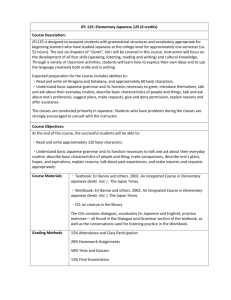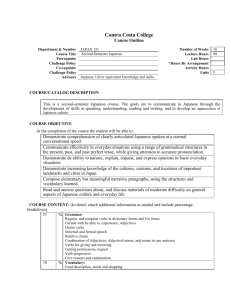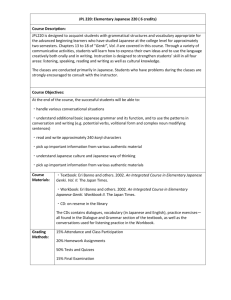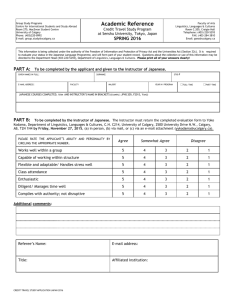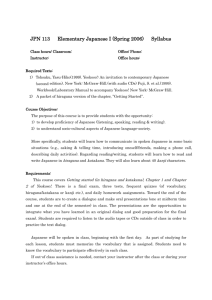JPN 2002 syllabus - Kennesaw State University
advertisement
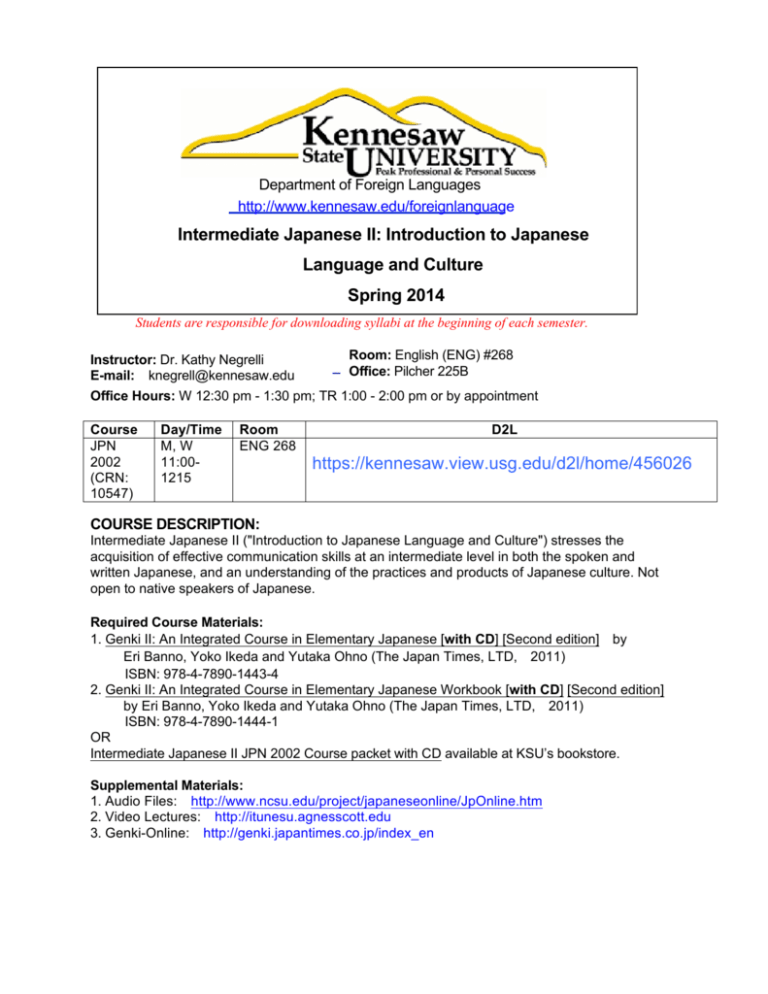
Department of Foreign Languages http://www.kennesaw.edu/foreignlanguage Intermediate Japanese II: Introduction to Japanese Language and Culture Spring 2014 Students are responsible for downloading syllabi at the beginning of each semester. Room: English #268 Instructor: Dr. Kathy Negrelli Office:(ENG) Pilcher 225B Office: Pilcher 225B E-mail: knegrell@kennesaw.edu Office Hours: W 12:30 pm - 1:30 pm; TR 1:00 - 2:00 pm or by appointment Course JPN 2002 (CRN: 10547) Day/Time M, W 11:001215 Room ENG 268 D2L https://kennesaw.view.usg.edu/d2l/home/456026 COURSE DESCRIPTION: Intermediate Japanese II ("Introduction to Japanese Language and Culture") stresses the acquisition of effective communication skills at an intermediate level in both the spoken and written Japanese, and an understanding of the practices and products of Japanese culture. Not open to native speakers of Japanese. Required Course Materials: 1. Genki II: An Integrated Course in Elementary Japanese [with CD] [Second edition] by Eri Banno, Yoko Ikeda and Yutaka Ohno (The Japan Times, LTD, 2011) ISBN: 978-4-7890-1443-4 2. Genki II: An Integrated Course in Elementary Japanese Workbook [with CD] [Second edition] by Eri Banno, Yoko Ikeda and Yutaka Ohno (The Japan Times, LTD, 2011) ISBN: 978-4-7890-1444-1 OR Intermediate Japanese II JPN 2002 Course packet with CD available at KSU’s bookstore. Supplemental Materials: 1. Audio Files: http://www.ncsu.edu/project/japaneseonline/JpOnline.htm 2. Video Lectures: http://itunesu.agnesscott.edu 3. Genki-Online: http://genki.japantimes.co.jp/index_en Course Description and Goals This is the 2nd of two courses in Intermediate Japanese. It assumes general knowledge of vocabulary, sentence patterns, writing, and culture covered through JPN 2001. Emphasis is placed on expanding basic vocabulary, expressions and grammar in the context of daily life. Goals of this course include: 1. Reviewing material introduced in L.10-12 of Genki I. 2. Learning additional basic vocabulary and structural patterns introduced in L.13-15 of Genki II. 3. Increasing familiarity with Japanese culture and Japanese behavior 4. Understanding how the language is used to interact in a variety of daily situations 5. Reading and writing hiragana, katakana, and kanji that have already been introduced, and learning about 48 additional kanji. 6. Being able to carry on conversations which involve talking about: ・ abilities ・ giving/receiving presents/a favor ・ planning a trip ・ one’s determinations Overall Grade Distributions Daily class performance……………………………………………………………… Homework / assignments…………………..………………………..……………. Quizzes………………………………………………………………………………… Tests …………….……………………………………………..……………………… Project …………….……………………………………………..…………………… Final Oral [10%] /Aural [5%] Exam ……………………………………………...... Grading Scale: A: 90-100% B: 80-89% C: 70-79% D: 60-69% 25% 20% 10% 15% 15% 15% F: 59% and below Class Performance You will be held to the highest standards of conduct and contribution when determining the class performance grade, which will be based on the following: 10.0 = Active participation*, and successful completion of class activities** 9.0~9.9 = Active participation, and few errors in class activities 8.0~8.9 = Participation with some errors in class activities 7.0~7.9 = Limited participation and/or frequent errors (after repeated corrections) 0.0 = Unexcused absence or no participation in class activities *”Active participation” is defined as “paying close attention to instructions, providing immediate and pertinent responses when prompted, being proactively involved in speaking and listening activities in pair or group exercises, etc.” **Your oral performance will be considered “successful” if you demonstrate good listening comprehension, use grammatically accurate words/expressions, and speak in sentences at a steady pace, using correct pronunciation. Extra Credit/Bonus: Extra credit/bonus may be earned by the following: 1. perfect or near-perfect attendance 2. cultural activities: attend 3 different on- or off-campus Japanese culture-related Japanese event and write a brief account (200 words minimum per event; written in English) of each experience, and submit at the end of the semester. Cultural events include, but are not limited to: a) participation in the KSU Year of Japan and/or Japan Club’s sponsored events b) volunteer assistance in the SAUPO conference on campus c) attending events at other institutions/venues (museums, restaurants, etc) 3. submission of assignments posted as “optional/extra credit” on the schedule 4. documentation of Foreign Language Resource Center (FLRC) activities, such as: a) working with a tutor, for conversation, etc b) practicing with the audio files c) working on Japan-related websites to explore the Japanese culture online [see me for the FLRC Task Form] Course requirements: A. Attendance: Attendance is mandatory. However, you are allowed two (2) absences (excused or otherwise) without penalty. After these 2 absences, class performance scores will be calculated as zeros when averaged into the final grade. B. Late arrival/early departure: A late arrival is defined as arrival after the first five (5) minutes of class. Early departure is defined as leaving ten (10) minutes or more before class ends. Your class performance grade will be lowered by 10% with every late arrival and early departure unless excused by the instructor. C. Homework: Assignments must be submitted on the teacher’s desk at the beginning of class. Maximum points are given for assignments that are completed in their entirety, thoughtfully, carefully, and with few errors. No credit will be given for homework submitted late, unless it is submitted on the day back after an absence. Some assignments will be “self check” assignments. You will find the answer keys in the WB Answer Key Folder and/or specific lesson folder on D2L. Use a different colored pen (preferably red) for self correction and submit on the due date posted on the tentative schedule. These assignments will be evaluated on: 1. completion of initial work on your own 2. self correction 3. on-time submission D. Assessments: There will be at least 6 vocabulary quizzes, at least 3 kanji quizzes, and 3 chapter tests. There will also be a Final Aural Exam (on Mon., 4/28) and an Oral Exam (on Wed., 4/30). Talk to the instructor if you know you will be absent for a legitimate reason. With prior notification, you may be permitted to take the assessment in advance. If you leave early or arrive late or are absent, you may miss the chance of taking an assessment. E. Audio Program: You are required to listen to and practice the dialogs, exercises, vocabulary, etc. in both the Textbook and Workbook using the Audio Program available either online or with the CD. Deadlines: It is your responsibility to turn in assignments at the start of each class, and take assessments on time as indicated on the schedule. If you are unable to submit an assignment due to legitimate, predetermined circumstances, notify the instructor before it happens, and submit the assignment the day you return to class. Other Expectations: You are expected to 1. bring all materials and books to each class, and come to class having prepared the material on the syllabus for that day and ready to participate actively in class. 2. respond in communicative exercises and class activities. 3. refrain from speaking in languages other than Japanese unless instructed. 4. check D2L (and e-mail) daily and to respond to instructor’s messages promptly 5. print out necessary materials uploaded and posted on D2L 6. maintain an organized folder of all homework, quizzes, handouts, etc. for the class 7. keep track of your scores and grades throughout the semester. Miscellaneous: A. Classroom courtesy: You are asked to refrain from eating in class and to show respect to your classmates. Also, all electronic devices (laptops, cell phones, ipads) should be turned off during class. B. Academic Honesty: All work in this course must follow the guidelines of the KSU Academic Honesty Policy as published in the Undergraduate and Graduate catalogs. Students are expected to abide by the Policy and avoid any instances of academic misconduct, such as: 1. Possessing, using, or exchanging improperly acquired written or oral information in the preparation of any quiz or test, or completion of any written homework/ assignment. 2. Substitution of material that is wholly or substantially identical to that created or published by another individual or individuals. Cheating/copying/plagiarizing will result in a grade of zero (0) on that homework, quiz, or test + 5 points off the final grade for the course [first offense]. A 2nd violation will be handled through the established procedures of the University Judiciary Program. C. Disability Policy: Kennesaw State University provides program accessibility and reasonable accommodations for persons identified as disabled under Section 503 of the Rehabilitation Act of 1973 or the Americans with Disabilities Act of 1990. A number of services are available to help disabled students with their academic work. In order to make arrangements for special services, students must visit the Office of Disabled Student Support Services (ext. 6443) and arrange an individual assistance plan. Certification of disability is required for any special arrangements to be made for this class. D. Course evaluations: Near the end of the semester you will be notified by e-mail and provided with a link to follow to complete the evaluations on-line outside of class. Your feedback on evaluations is extremely valuable to me, the department, and the administration. I take your comments very seriously and use them to improve the course the next time I teach it. Completion of this evaluation is expected; your cooperation and assistance in this endeavor is much appreciated. THE KEY TO SUCCESS IN THIS CLASS IS TO COME TO CLASS PREPARED, HAVING STUDIED AND PRACTICED THE MATERIAL LISTED ON THE SCHEDULE AS CLASS ACTIVITIES AND ASSIGNMENTS, AND ACTIVELY PARTICIPATING IN CLASS DAILY. JPN 2002 Intermediate Japanese II Statement of Acknowledgment and Understanding I have read and understand all the rules and conditions presented in this document. I further understand that it is my responsibility to read the entire document and ask questions of the instructor to clarify any points that I do not understand or that are not clear upon reading. Once this statement has been signed and returned to the instructor it is implied that I understand the contents as they appear and are interpreted by the Instructor, and thus waive any opportunity to ask for clarification or challenge anything presented in the proceeding pages of this document. Interpretation of the contents is solely up to the instructor and is not open to debate at any time with the student. My signature on this document is required in order to qualify to take any exam in this course. Failure to return a signed and unaltered copy of this document to the instructor before the first exam will result in the Instructor’s refusal to allow me to take the exam. I have read all of the items contained in the entire syllabus and have asked for clarification from the Instructor on any points upon which I needed further clarification. Printed Name: ________________________________________ Signature: ________________________________________ Date: ____________

